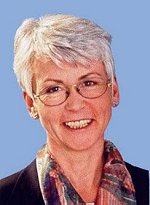
Message of greeting from the Chairperson of
the Committee on Family Affairs, Senior Citizens, Women and Youth,
Christel Hanewinckel

Christel Hanewinckel,
committee chairperson
On 1 January 2000 the Committee on Family Affairs, Senior Citizens, Women
and Youth ![]() |assumed the presidency of the
Network of Parliamentary Committees on Equal Opportunities for
Women and Men of the EU Member States and of the European
Parliament.
|assumed the presidency of the
Network of Parliamentary Committees on Equal Opportunities for
Women and Men of the EU Member States and of the European
Parliament.
The aim of the Conference of National Parliaments on Equality for Women and Men is to intensify the exchange of experience and views among the relevant committees of the national parliaments and jointly to pursue and promote equality within the framework of European integration. Each year a committee from one EU country holds the presidency; following Belgium (1997), Portugal (1998) and Spain (1999) Germany holds the presidency in the year 2000.
The most important event during each presidency is the annual
Conference, to which all states send participants. We shall hold
this year's
Conference in Berlin ![]() |
at the end of the year 2000, probably on 17 and 18 November. The
Spanish organizers chose as the main topic the involvement of women
in politics and the general conditions which have to be taken into
consideration, including the need to reconcile political activities
with women's responsibilities in the family. With our topic we want
to go back a step, as it were: we do not want to start with women
who are already working and ask what we can do to resolve or at
least improve the apparently inevitable conflicts between
employment and work in the family; a question which, strangely
enough, only women are ever asked and which only women ever ask
themselves. We want to focus on the main reasons for the vocational
training girls and young women choose. It is remarkable that young
women opt for occupations which are either typically female
occupations or which offer no chance of advancement. This decision
sets the course for their subsequent employment. To this end, we
will commission an
opinion from renowned experts
|
at the end of the year 2000, probably on 17 and 18 November. The
Spanish organizers chose as the main topic the involvement of women
in politics and the general conditions which have to be taken into
consideration, including the need to reconcile political activities
with women's responsibilities in the family. With our topic we want
to go back a step, as it were: we do not want to start with women
who are already working and ask what we can do to resolve or at
least improve the apparently inevitable conflicts between
employment and work in the family; a question which, strangely
enough, only women are ever asked and which only women ever ask
themselves. We want to focus on the main reasons for the vocational
training girls and young women choose. It is remarkable that young
women opt for occupations which are either typically female
occupations or which offer no chance of advancement. This decision
sets the course for their subsequent employment. To this end, we
will commission an
opinion from renowned experts ![]() |
in this field in order to have a sound basis for our work. In this
connection, the causes are to be stated in the field of individual
orientation e.g. as a result of the family or the possibility of
reconciling the occupation with one's own family, on the one hand,
and with structural conditions, on the other (such as opportunities
on the labour market, the influence of vocational guidance, schools
and other educational institutions) in Germany. The other
participating countries are to be included, once the specific
criteria of the study have been defined, and in a structured manner
asked about their experience and insights. On this basis a
political discussion can then take place which throws light on the
topic, makes it possible to draw comparisons with neighbouring
countries and forms the basis of final conclusions which can
generate impulses for national and European policies.
|
in this field in order to have a sound basis for our work. In this
connection, the causes are to be stated in the field of individual
orientation e.g. as a result of the family or the possibility of
reconciling the occupation with one's own family, on the one hand,
and with structural conditions, on the other (such as opportunities
on the labour market, the influence of vocational guidance, schools
and other educational institutions) in Germany. The other
participating countries are to be included, once the specific
criteria of the study have been defined, and in a structured manner
asked about their experience and insights. On this basis a
political discussion can then take place which throws light on the
topic, makes it possible to draw comparisons with neighbouring
countries and forms the basis of final conclusions which can
generate impulses for national and European policies.
